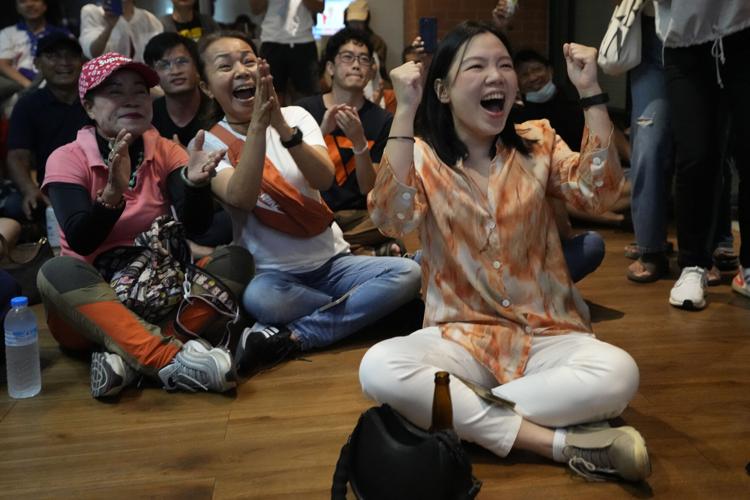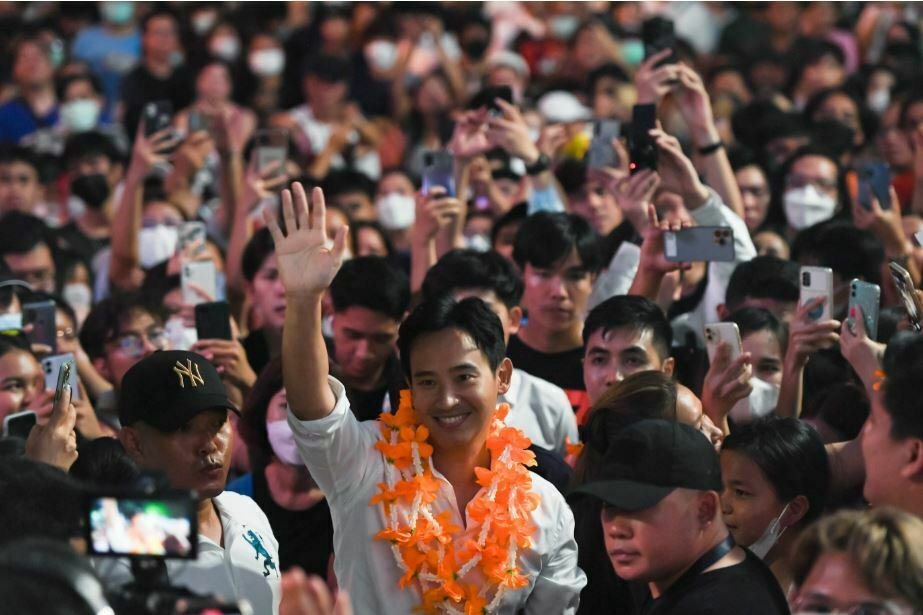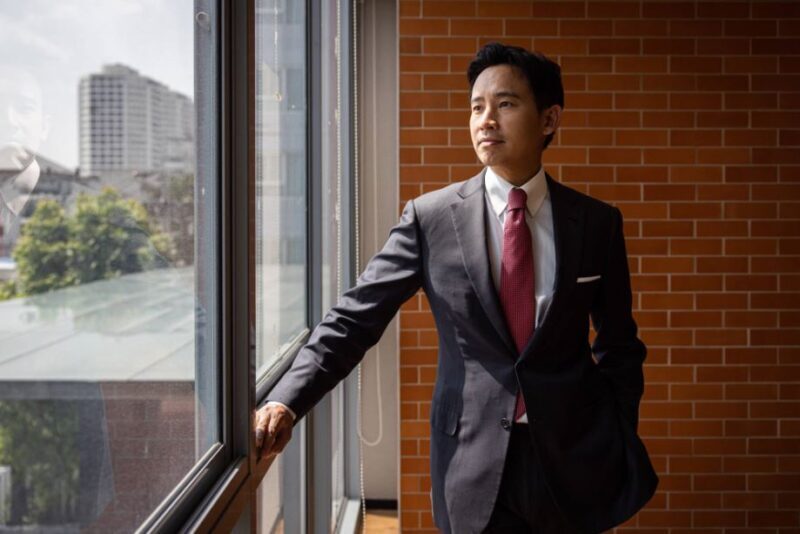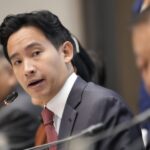In the Thai election, Pita Limjaroenrat successfully led his party to victory, and unless the military intervenes, he is set to take over as prime minister.
Pita Limjaroenrat observed his American classmates who were supporting former President Barack Obama at the time they were running for office when they were Harvard students in 2008. He gained insight into political politics through the process, from phone banks and polling data to door-to-door canvassing and planting campaign flags on front lawns.

After 15 years, Mr. Pita said that he had used the knowledge he had gained in Massachusetts to his most recent campaign in Thailand, where he had shocked the nation’s political elite by inspiring his liberal Move Forward Party to a historic victory.
The two main political parties that Thai voters had known for decades were one led by a populist millionaire living in exile and the other by conservative royalists and militarists. After nine years of military rule that was preceded by a coup, Mr. Pita, 42, was seen by supporters as the candidate who symbolized change and a return to democracy. On the campaign trail, he pledged to repeal a legislation that makes it illegal to criticize the monarchy as well as loosen the military’s hold on Thai politics.In an interview with The New York Times, he said, “What I need to do now is to find a road-map that bridges that gap between a functioning democracy and half-baked democracy at the very end of nine-year rule by a military coup.”

Mr. Pita must amass enough support in the 500-member House of Representatives to defeat a 250-member, military-appointed Senate in order to assume the position. He requires exactly 376 votes to win. He only has 314 as of yet.A number of senators have already declared they would not back a candidate who poses such a challenge to the existing quo. Thais are currently waiting to see if their preferred candidate will be permitted to take the helm or if the ruling elite would prevent him from becoming prime minister, which could result in political unrest in the nation.
Thai generals revised the Constitution in 2017 to allow the election of the country’s head of state by a Senate made up largely of military supporters. Conservatives anticipate a complaint against Mr. Pita from the Election Commission for failing to disclose his ownership of shares in a now-defunct media company that he inherited from his father.
Mr. Pita has so far dismissed the request for an investigation, claiming that he previously declared the shares to the authorities. Additionally, he stated that he thought a group of senators had “felt their conscience” and recognized the repercussions of defying the 25 million Thais who had cast their votes for change. Only 14 senators have said they will support him.Mr. Pita received a dual degree from the Massachusetts Institute of Technology’s Sloan School of Management and the Harvard Kennedy School. He acquired campaign planning skills while living in the US, which he applied to this race by using data to contact voters in 160 districts.

As managing director of his father’s rice-bran oil company and later as a top executive for Grab, the ride-hailing startup that bought Uber in Southeast Asia, Mr. Pita spent the most of his career in consulting and business.
As a contender, Mr. Pita gained a reputation as a persuasive speaker who won over the electorate with his remarks and dapper appearance.
He declared his admiration for José Alberto “Pepe” Mujica Cordano, a former president of Uruguay who endured torture and imprisonment under the military dictatorship that ruled that nation at the time. Senator Bernie Sanders’ book “It’s OK to Be Angry About Capitalism” is what he is reading. Metallica, The Strokes, and Rage Against the Machine are some of his favorite musical acts. In one popular TikTok video, a Thai woman performs a fictitious wedding ceremony with a cutout of Mr. Pita, a divorcee with a young daughter.
He’s basically the perfect son-in-law you’d like to have for a lot of middle class Thais, especially upper middle class Thais, according to Duncan McCargo, a political science professor at the University of Copenhagen. He’s highly educated, accomplished, good-looking, and poised.
In 2018, Mr. Pita became interested in the views of Thanathorn Juangroongruangkit, the party’s founder, and a few months later, he received an invitation to join. After Future Forward was shut down by Thailand’s Constitutional Court in 2020 and its senior leaders were banned from politics for ten years, he took the helm of Move Forward.
If Mr. Pita is elected prime minister, he has pledged to reform Thailand’s foreign policy, stating the nation would “not be part of the Chinese umbrella or the American umbrella,” but instead would have the freedom to choose its own course. He stated on Twitter in March 2022 that the Russians ought to “retrieve” their troops right away following Moscow’s invasion of Ukraine.
Fuadi Pitsuwan, a fellow at Chiang Mai University and Mr. Pita’s foreign policy advisor, described the candidate’s strong response to the invasion as being “largely personal.” He will be a leader in foreign policy, which is uncommon in Thailand.
The reputation of Mr. Pita has not been unharmed. He has a daughter with actress Chutima Teepanart, who is also his ex-wife, and she accused him of domestic violence in 2019. Mr. Pita was found not guilty of the accusation by a family court. In spite of numerous attempts for comment, Ms. Chutima did not react.
Mr. Pita stated in an interview that “neither physical abuse nor emotional abuse ever occurred in my family.”
Mr. Pita was born into an affluent, prominent family. His uncle was formerly a close assistant to Thaksin Shinawatra, the populist tycoon whose youngest daughter was one of Mr. Pita’s opponents in the race, and his late father served as a consultant to the agricultural minister.
Early in the 1980s, his uncle served as minister of commerce; nevertheless, the case in which he was sentenced for wrongdoing committed while serving as a banker was politically driven, according to Mr. Pita. Visiting his uncle in prison as a child was a memorable experience that opened his eyes to “how dirty or how brutal politics could be,” he added.Mr. Pita claimed that throughout the years, he had been struck by how Thailand appeared to be perpetually mired in a cycle of political unrest, which was either sparked by someone “using the king to destroy a political opponent or using the monarchy as an excuse to fight for something.”
He stated he started to see why the connection between the Thai monarchy and the people was “going downhill” with each passing decade after studying other nations with constitutional monarchs such as England, Japan, and Norway.He wants “to have a comprehensive discussion in Parliament about what the role of the monarchy in a constitutional democracy should be in modern Thailand,” an idea that was once frowned upon by many Thais for whom the royal family has become a part of everyday life.
The military and royalists have united to protect the institution in response to calls for restrictions on the monarchy’s authority, which were sparked by demonstrations in 2020.
Prime Minister Prayuth Chan-ocha, the military who oversaw the last coup and whose party lost the election, launched a crackdown after the protests. Since then, more than 200 demonstrators—including 17 minors—have been arrested for opposing the monarchy.
Mr. Pita reminded the gathering during the last protest before the vote that even a 15-year-old girl had been imprisoned for breaking the royal criticism ban. He spoke in front of thousands of his fans on Monday as they congratulated him on winning the election.
He spoke to the audience while standing in front of a massive painting of the king in Bangkok’s downtown, telling them that “a new day for the people has arrived.”





